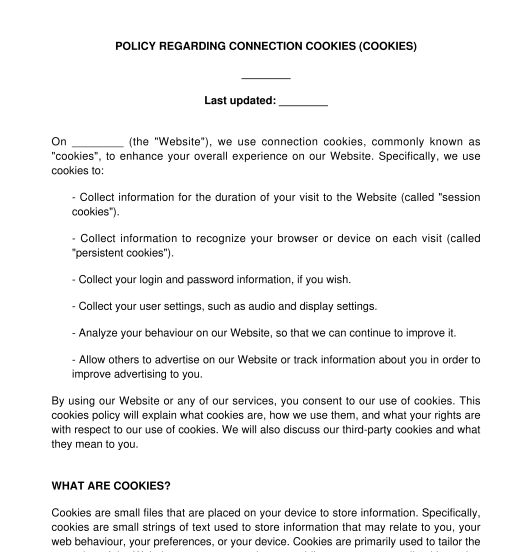 08/11/2025
08/11/2025

Answer a few questions and your document is created automatically.

Your document is ready! You will receive it in Word and PDF formats. You will be able to modify it.

 08/11/2025
08/11/2025
 Word and PDF
Word and PDF
 3 to 4 pages
3 to 4 pages
A cookies policy is a document used by the owner or operator of a website to describe to users how cookies are used on that website. The cookies policy is considered an agreement because users indicate their assent in a specific way, usually by clicking on a checkbox or pop-up window indicating that they have read and accepted the cookies policy. In general, however, the cookies policy is really about the website owner/operator explaining to users how cookies are used.
It is necessary to have a clearly defined cookies policy especially when running a business or personal website that allows users to interact with everything on it, including storing some data through cookies.
If the user knows what to expect, it is less likely that there will be problems between the user and the website later on.
Cookies policies are available on almost every major website today, and the operator needs to ensure that a good policy is in place for their business. This cookies policy is primarily intended for use in Canada, but it is also compliant with the European Union's General Data Protection Regulation (GDPR), for companies that handle and process the personal data of European Union citizens.
This Cookies Policy describes all the ways the website owner/operator uses cookies and what users can do to set their cookies permissions and how they can ask questions. Before filling out the document, the website operator should make sure they have all the necessary information about how the website works with cookies. This may involve doing technical checks or talking to others in the company about the security aspect of things.
In this document, the operator will be able to outline the following information (and more):
Once completed, this document should be posted in a prominent location on the website, with a link on the home page that says "Cookies Policy" or simply "Cookies" depending on the website.
It is essential to inform users about cookies and how their information will be handled. Often a cookies policy will be similar to a privacy policy, and perhaps even a terms and conditions document, which we also offer for sale.
While there is no single set of laws or regulations describing what a website's cookies policy should contain, website disclosures are largely governed by common law, the Canadian Code of Advertising Standards (the Code) and other advertising and privacy laws. Specific laws for each Canadian province and territory may also apply.
As mentioned above, this Cookies Policy also complies with the EU General Data Protection Regulation (GDPR) for companies that may process data of EU citizens.
You fill out a form. The document is created before your eyes as you respond to the questions.
At the end, you receive it in Word and PDF formats. You can modify it and reuse it.
Cookies Policy for Website - Template - Word & PDF
Country: Canada (English)